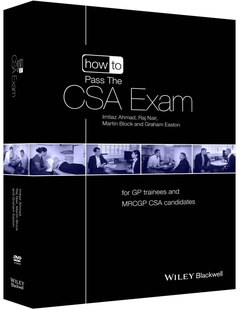Description
How to Pass the CSA Exam
for GP Trainees and MRCGP CSA Candidates
How to Perform Series
Authors: Ahmad Imtiaz, Nair Raj, Block Martin, Easton Graham
Language: English
Subject for How to Pass the CSA Exam:
Approximative price 106.18 €
In Print (Delivery period: 14 days).
Add to cart240 p. · 14x19.6 cm · Paperback
Description
/li>Contents
/li>Biography
/li>
Distinctively pairing video footage and role-play scenarios, How to Pass the CSA Exam presents a broad range of consultations in the most common clinical areas a trainee or GP ST3 is likely to encounter, to reinforce core knowledge and skills. Cases cover the entire CSA case selection blueprint, with a range of acute, chronic, undifferentiated, psychosocial and preventative cases in the different disease areas.
The two DVDs feature over 3 hours of consultations drawn from real life experience, with step-by-step explanations and points highlighted for examination, and include filmed panel discussion and feedback.
The accompanying guidebook mirrors the video content, with explanatory text, advice on how the exam works and how role players are briefed, 'CSA Plus' resources on broader issues encountered in everyday general practice, and links to relevant guidelines, e-learning modules, and further resources.
Developed by GP trainers, educators and programme directors based on their vast understanding of the consultation and exam process and proven experience, How to Pass the CSA Exam is a thorough and systematic companion to preparing for these examinations to help you optimise your skills and prepare for early practice life.
Includes consultations in:
• Diabetes
• Depression
• Back pain
• Dementia
• Breaking bad news
DVDs feature:
• 12 consultations (with trainee reflection and trainer feedback) (Duration approx. 180 minutes)
• Top tips from round-table discussions with trainees who recently passed the CSA exam (Duration approx. 30 minutes)
The authors of How to Pass the CSA Exam also provide a high quality, up-to-date and comprehensive course specifically designed for excelling in the MRCGP exam, featuring mock AKT paper and CSA exam with actors as role-players. For full details, visit www.londonmrcgp.co.uk
Acknowledgements v
Foreword vi
Introduction ix
1 The CSA Exam 1
What is it what are the examiners looking for and what can you expect on the day?
2 Consultation Skills for the CSA 15
A practical guide to consultation skills for the CSA exam
3 Physical Examination for the CSA 35
Brief tips on physical examination in the CSA
4 Common Themes Affecting CSA Performance 40
The pitfalls and how to avoid them
5 Complex Cases in the CSA 47
Tips on some of the more challenging types of CSA case
6 How to Use the CSA Practice Cases 54
A guide to using the practice cases and the DVD and a blueprint mapping cases to the RCGP curriculum
7 CSA Practice Cases 61
Cases (A)
1. Antenatal booking appointment 62
2. Polycystic ovarian syndrome (PCOS) 67
3. Chest pain (musculoskeletal) 71
4. Gout 74
5. New onset hypertension 78
6. Type 2 diabetes 82
7. Child protection 86
8. Drug withdrawal 90
9. Paediatric eczema 94
10. Renal colic 98
11. Upper respiratory tract infection 102
12. Palliative care 107
13. Acute stress 110
Cases (B)
1. Irritable bowel syndrome 115
2. Lower back pain (postdelivery) 119
3. Sexually transmitted disease (STD) and hypertension 123
4. Confidentiality and angry patient 127
5. Hearing loss 131
6. Erectile dysfunction and prescribing 135
7. Knee pain/weight loss/eating habits 140
8. Insomnia 144
9. Paternity testing 148
10. Multiple sclerosis 152
11. Nocturnal enuresis (telephone consultation) 157
12. Pulmonary embolism post-Caesarean section (home visit) 162
13. Allergic rhinitis 166
Cases (C)
1. Headache 171
2. Elder abuse (home visit) 176
3. Problem gambling 180
4. Prostate specific antigen (PSA) test 184
5. Female genital mutilation (FGM) 188
6. COPD exacerbation 192
7. Blood test results HIV positive 197
8. Breast lump (learning disability) 201
9. Request for sick note 205
10. Sickle cell (adolescent) 209
11. Diabetes (telephone consultation) 214
12. Asthma (teenager) 218
13. Acute red eye 222
Index 225
Imtiaz Ahmad is GP Principal and Trainer at South Lambeth Road Practice, London and Musculoskeletal Lead for Lambeth. He was awarded the RCGP South London Faculty Educator Award (2011) and is ourse Organiser for London MRCGP Courses
Raj Nair is Training Programme Director at Guy's & St Thomas' GP Specialty Training Programme; Associate Director of Postgraduate Medicine at Guy's & St Thomas' and GP Principal and Trainer, Albion Street Group Practice, South East London
Martin Block is Programme Director, Imperial GP Specialty Training Programme, and GP Principal and Trainer, Clapham Park Group Practice, London
Graham Easton is Senior Clinical Teaching Fellow and Educational Supervisor, Academic ST4 programme, Department of Primary Care and Public Health, Imperial College Medical School, London, and GP Principal and Trainer, Ealing, London




